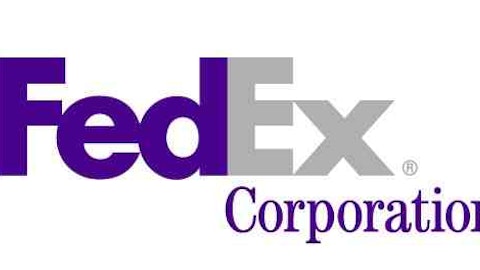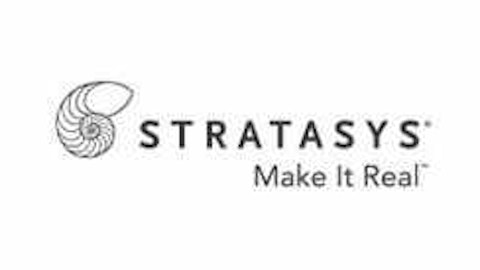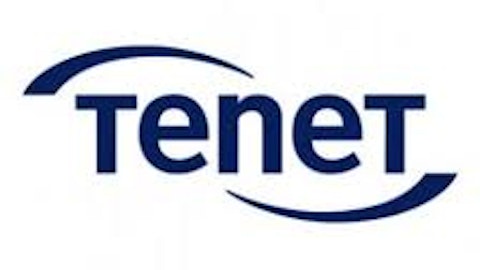The best thing about the stock market is that you can make money in either direction. Historically, stock indexes have tended to trend up over the long term. But when you look at individual stocks, you’ll find plenty that lose money over the long haul. According to hedge fund institution Blackstar Funds, even with dividends included, between 1983 and 2006, 64% of stocks underperformed the Russell 3000, a broad-scope market index.

| Company | Short Increase July 15 to July 31 | Short Shares as a % of Float |
|---|---|---|
| Vanguard Health Systems (NYSE:VHS) | 67.7% | 4.8% |
| Realty Income (NYSE:O) | 30.1% | 6.4% |
| United Parcel Service (NYSE:UPS) | 31.7% | 2.2% |
Source: The Wall Street Journal.
A head-scratcher
I freely admit that among hospital and outpatient acute-care operators, Vanguard Health Systems, Inc. (NYSE:VHS) is probably my least favorite. With few differentiating factors between hospitals aside from their forward valuation to earnings and the amount of doubtful revenue collected as compared to total revenue, Vanguard Health Systems, Inc. (NYSE:VHS) appeared to me to be one of the priciest stocks in the hospital industry.
However, that all means diddly squat now with Tenet Healthcare agreeing in June to purchase Vanguard for $1.8 billion, or $21 per share in cash. Had this deal been structured to include Tenet shares as well as cash, I could see why short-sellers would be pressing the issue. But since this deal is being done entirely in cash, unless it were to fall apart due to some form of negligence on either company’s part, then short-sellers are going to lose — albeit not a lot, but they’re going to lose.
If short-sellers really want to take an aggressive angle on this deal, they should be looking at betting against Tenet Healthcare, which is taking on $2.5 billion in Vanguard Health Systems, Inc. (NYSE:VHS)’s net debt with this deal and may struggle to bring in new business if consumers are slow to sign up for health insurance under the Patient Protection and Affordable Care Act, known also as Obamacare. In addition, the rapidly approaching Oct. 1 date, which will see state-run health exchanges open for business compared to the massive technological and educational aspects of the bill that still need to be addressed, could give short-sellers the opportunity they’ve been looking for in the hospital sector with companies like Tenet.
Do you dislike money?
Sometimes the actions of short-sellers boggle my mind. In addition to a big boost of folks betting against Vanguard Health Systems, Inc. (NYSE:VHS), short-sellers were active in building their pessimistic position against commercial real estate investment trust Realty Income Corp (NYSE:O). This REIT, which owns nearly 3,700 properties in all but one U.S. state and leases to almost 200 different corporate entities, recently reported record revenue and insanely high occupancy rates in the second quarter, and should, if anything, be sending short-sellers scurrying back where they came from with their tails tucked between their legs.
For the quarter, Realty Income Corp (NYSE:O) delivered revenue growth of 63% to $184.3 million as normalized funds from operations (the true “profit” of a REIT, and what helps determine its dividend payout) rose 83% to $119.2 million. In addition to making earnings-accretive property acquisitions, Realty Income Corp (NYSE:O) was able to pass along a 1.1% rent increase to its tenants, improve its rental occupancy 90 basis points to 98.2% from 97.3% in the year-ago period, and recently declared its 517th consecutive monthly dividend complete with 64th straight quarterly dividend increase.
What makes Realty Income Corp (NYSE:O) so unique is the quality of its tenant portfolio. Many of Realty Income Corp (NYSE:O)’s peers offer a tenant portfolio with a much higher number of below-investment-grade renters. Think, for instance, about its peers that rent to chain stores like OfficeMax, which is closing stores, or Borders Group, which liquidated. By contrast, Realty Income Corp (NYSE:O)’s portfolio is predominantly made up of investment-grade companies, and more than 55% of its leases are for the long term, with expirations in 2023 or beyond.
With a monthly dividend that currently pays out 5% annually and a tenant portfolio that’s about as close to perfect as any investor could hope for, this might be among the best investments across the REIT space. Bet against this stock? No way!
What can brown do for you?
When it comes to shipping a package, there aren’t too many options to choose from, which immediately places United Parcel Service, Inc. (NYSE:UPS), or UPS, and rival FedEx Corporation (NYSE:FDX) in a clearly advantageous position with regard to pricing power. Both logistics companies are well aware that consumers have few shipping choices, so it saves these two foes from getting into a pricing war.
But external growth factors overseas have become both the boon and bane of shippers like UPS and FedEx Corporation (NYSE:FDX). Austerity measures throughout most of Europe have reduced government spending and trickled down to businesses and European consumers, who are doing everything they can to save money. What this has meant for FedEx is lower priority overnight shipping despite higher international shipping volume. The same can be said for United Parcel Service, Inc. (NYSE:UPS), which saw international package volume rise 5%, but saw a 3.4% decline in higher-margin, next-day services. This trade-down effect has been a savior in that it hasn’t cut off demand completely, but it’s made boosting the bottom line difficult without the aid of cost-cutting and share repurchases.
Ultimately, the question is whether or not short-sellers should be betting against UPS. The answer, I believe, is a definitive “maybe.” UPS’ cash flow, international package volume increases, ability to cut costs, and impressive dividend are all reasons that pessimists have no business betting against UPS. Then again, its highest-margin business segment is suffering, and its business is intricately tied to the state of the global economy, which still remains shaky at best.
Foolish roundup
This week’s reminder is that you’re just not going to understand all investors all the time. Why pessimists would bet against a company being purchased at a higher price than its current value in cash, or assume a commercial REIT with a rising monthly dividend and a predominantly investment-grade portfolio of tenants with a 98.2% occupancy rate is going to head lower, is beyond me. Then again, whereas UPS might appear a no-brainer buy, short-sellers have raised some eyebrows recently where only optimism had existed previously.
The article Shorts Are Piling Into These Stocks. Should You Be Worried? originally appeared on Fool.com and is written by Sean Williams.
Fool contributor Sean Williams has no material interest in any companies mentioned in this article. You can follow him on CAPS under the screen name TMFUltraLong, track every pick he makes under the screen name TrackUltraLong, and check him out on Twitter, where he goes by the handle @TMFUltraLong.The Motley Fool recommends FedEx and United Parcel Service.
Copyright © 1995 – 2013 The Motley Fool, LLC. All rights reserved. The Motley Fool has a disclosure policy.




